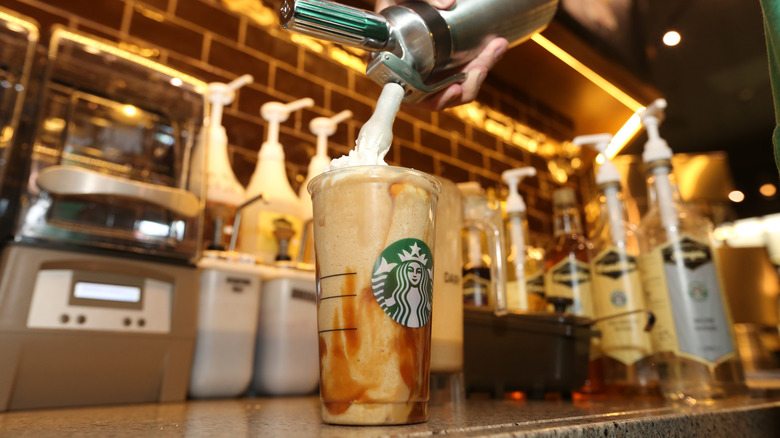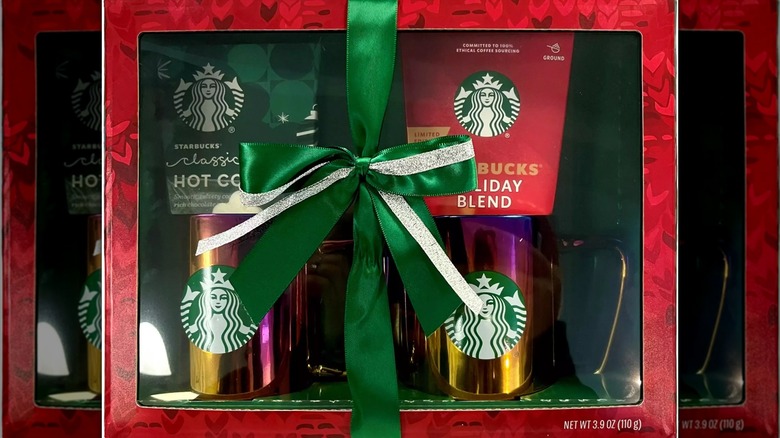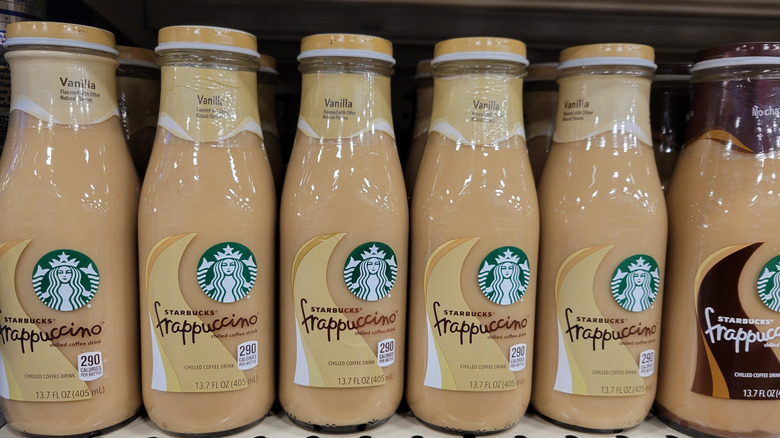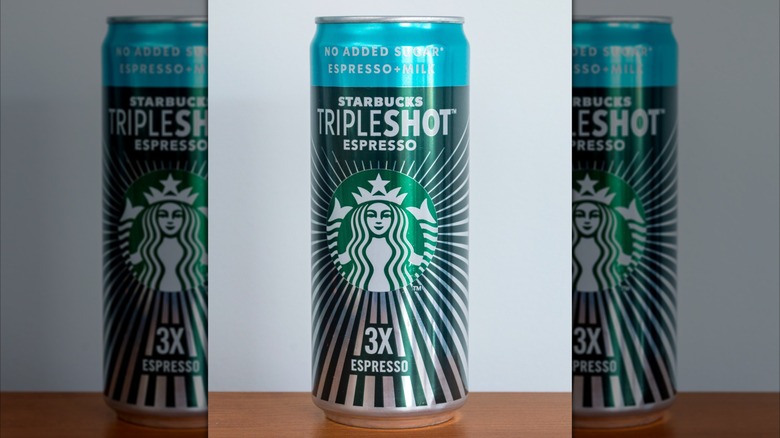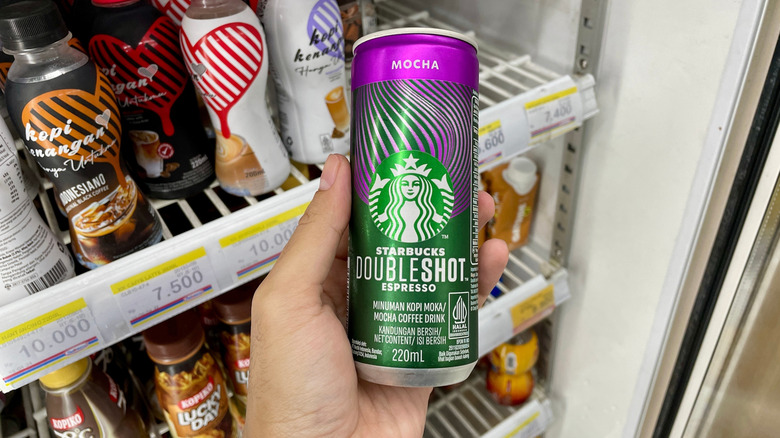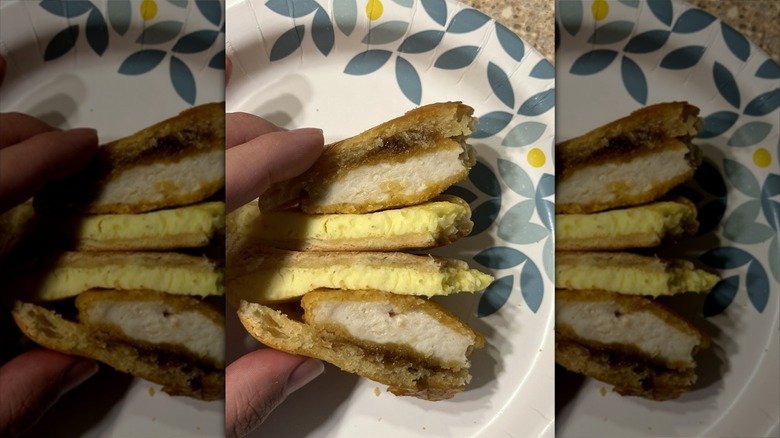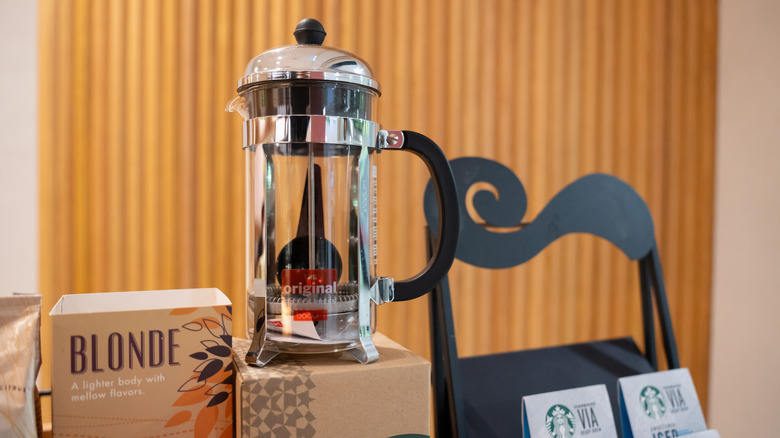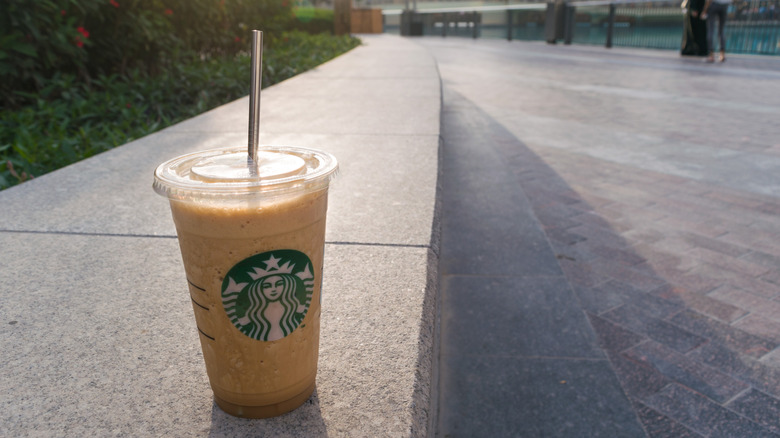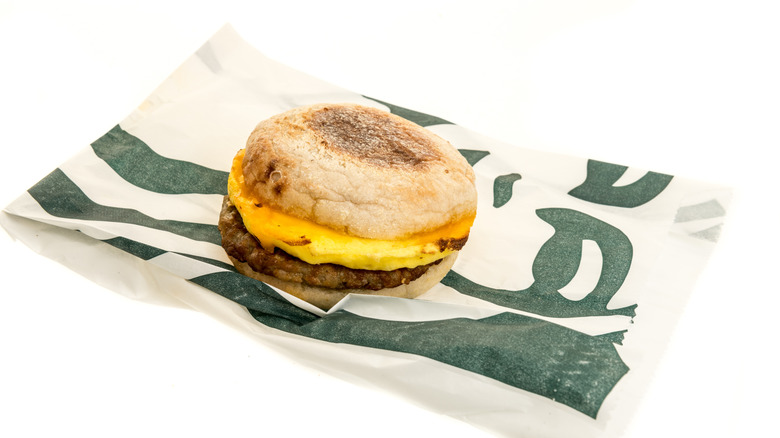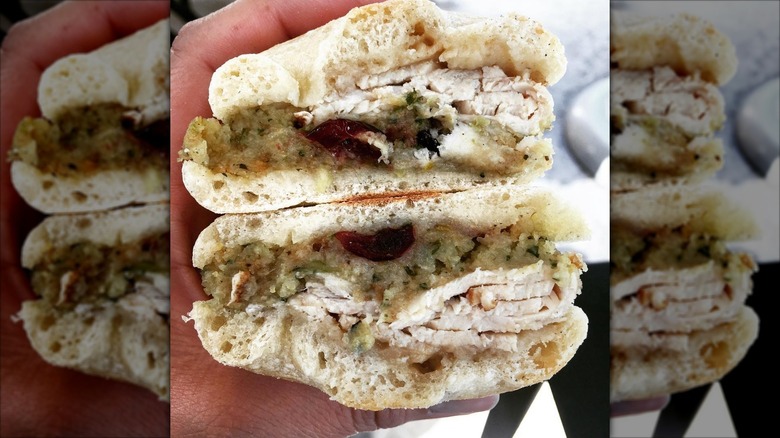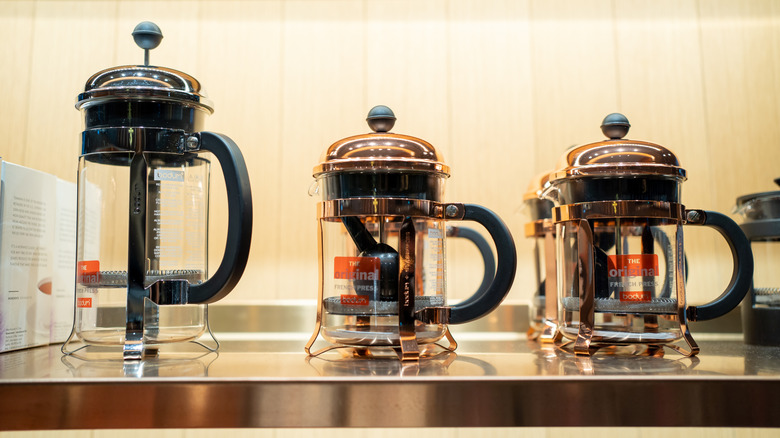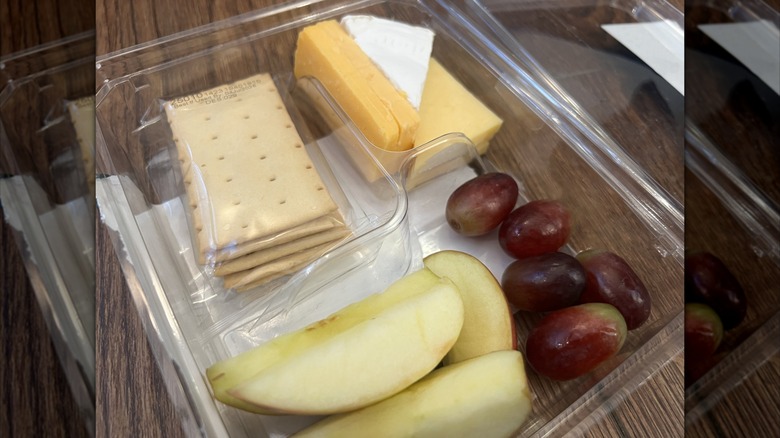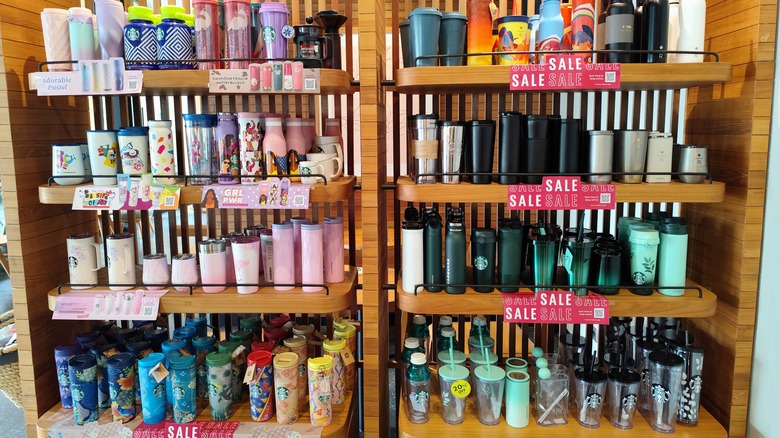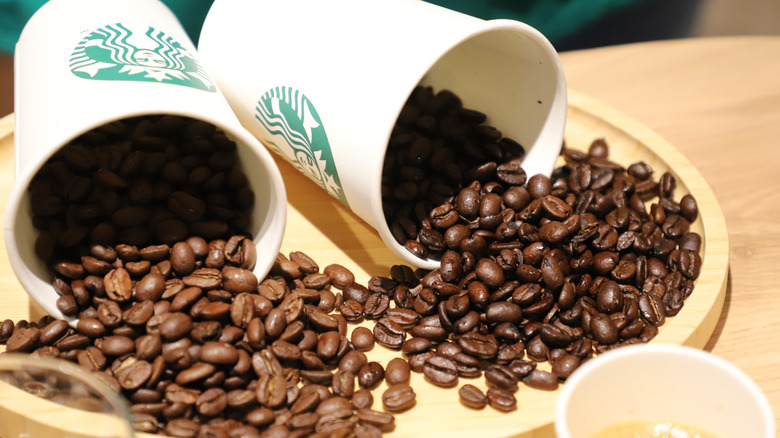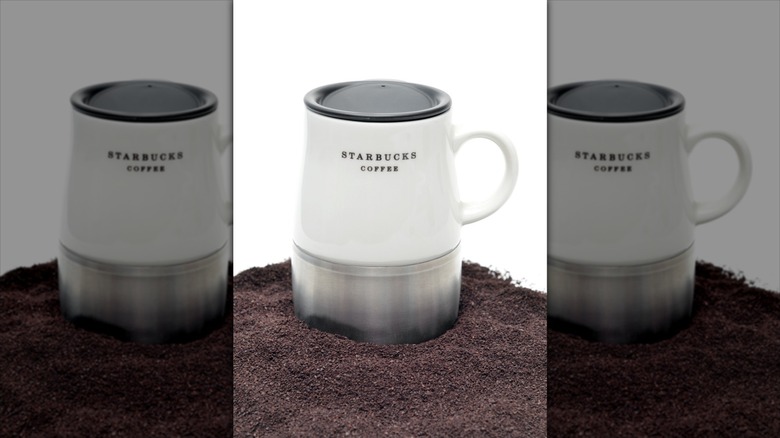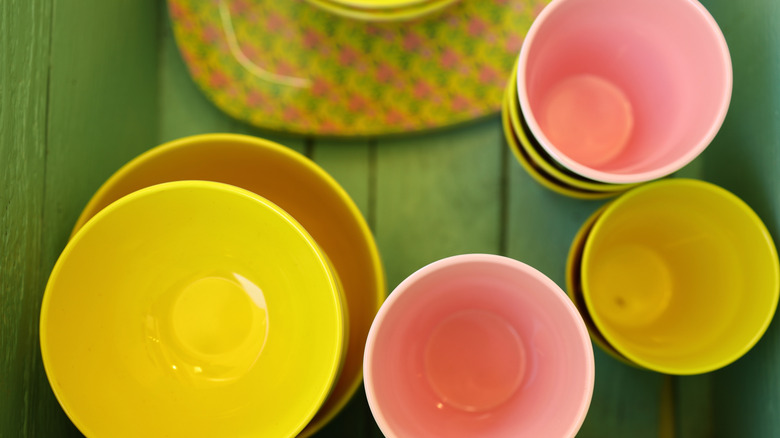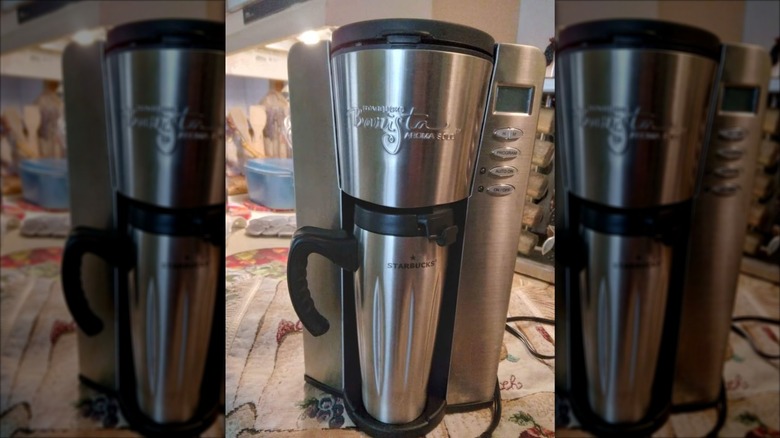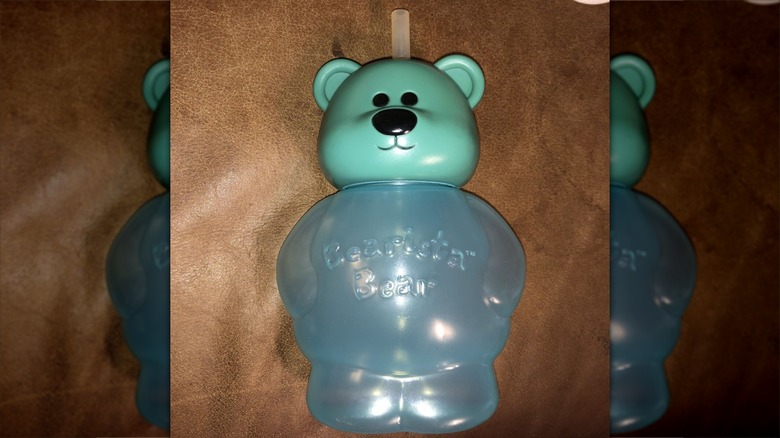Starbucks Recalls That Affected Millions
We may receive a commission on purchases made from links.
It's no secret that Starbucks is a global superpower. What started as a simple coffee shop has become one of the biggest restaurant chains on earth, as well as selling various branded food and drink items and coffee-related, non-food products such as mugs and coffee makers. That growth doesn't seem like it's going to slow down anytime soon. As of 2023, Starbucks boasted over 17,000 stores in North America and over 20,000 stores across nearly a hundred international markets, with goals to expand its total number of stores to 55,000 by 2030. That equates to an average of eight stores per day.
But with all that growth and expansion, there are bound to be some problems along the way. Like plenty of retailers its size, Starbucks has been struck by multiple recalls in its time. From mugs to canned coffee, a range of issues have popped up in Starbucks products over the years. These recalls are the worst of the bunch, having impacted millions of Starbucks fans around the world.
Metallic mugs were recalled in 2024 after a string of injuries
How many coffee lovers have received one of those Starbucks gift sets around the holidays? Back in 2023, some fans may have received a gift set containing a shiny metallic mug and some packets of hot cocoa or coffee. A few months after the festive period came to a close, Nestlé recalled the mugs, which came in two sizes and four different gift sets.
The sets had been sold at Target, Walmart, and Nexcom military outlets. At the time of recall, there had been reports of 12 incidents in which the mugs had broken when microwaved or filled with very hot liquids. This, of course, posed the threat of burns or lacerations, with 10 of the 12 consumers who reported the issue also reporting some degree of injury. One of these injuries even required medical attention. About 440,500 gift sets were impacted in total, with Nestlé asking that consumers contact the company for a full refund.
Starbucks Frappuccino bottles were pulled over the risk of glass in 2023
In early 2023, PepsiCo issued a recall for its vanilla-flavored bottles of Starbucks Frappuccino, claiming that they could contain un unwanted ingredient: broken glass. The company recalled over 25,000 cases of the drink, adding up to over 300,000 bottles sold at the likes of Target, Amazon, Walmart, and Safeway.
The Food and Drug Administration (FDA) categorizes recalls by the potential threat that the organization believes the recalled food or drink poses to the public. In this case, the FDA defined the recall as a Class II incident, meaning it thought there was a possibility that the Frappuccino bottles could cause temporary health issues. Luckily, while many recalls aren't issued until a consumer is actually harmed by a product, this was one of the lucky instances in which no injuries were reported to PepsiCo at the time of the recall. While the company didn't explain exactly how the glass made its way into the bottles, foreign objects often end up in food products due to issues during the manufacturing process.
Metal fragments sparked a recall of Starbucks Tripleshot Espresso in 2022
Another cold Starbucks beverage sold in grocery stores was recalled in 2022, again due to the possible presence of foreign objects in the beverages. This time, the foreign object in question was fragments of metal, while the beverage was the vanilla-flavored Starbucks Tripleshot Espresso.
Over 200 cases of the drinks featuring a best buy date of March 20, 2023, were recalled. The cans were distributed across a very large area, spanning Arkansas, Arizona, Illinois, Indiana, Florida, Oklahoma, and Texas. Again, it was never explained how the metal fragments made their way into the drinks. It also wasn't the first recall for the brand's espresso-based canned beverages. No report was made as to whether anyone was injured by the metal fragments, but PepsiCo urged anyone who thought they may have encountered the fragments to seek medical care.
Starbucks Doubleshot Espresso cans were recalled in 2021 due to inadequate sealing
Just one year before Starbucks Tripleshot Espresso cans were pulled from shelves, Starbucks and PepsiCo saw another recall of espresso canned beverages. This recall extended much further, impacting over 250,000 cases of the Espresso & Cream, Espresso & Light Cream, and Espresso & Salted Caramel Cream variations of the Doubleshot beverage, all of which had been inadequately sealed.
While this certainly seems like it would be less of a worry than finding glass or metal in your drink, the inadequate sealing could have potentially led to the drinks — and, more specifically, the milk in the drinks — spoiling far faster than anticipated, meaning that the expiration dates on each product package were null. While drinking spoiled milk isn't likely to kill you, so long as you're a generally healthy individual, it can result in some unfortunate gastrointestinal distress. Again, PepsiCo and Starbucks did not say if anyone had reported any adverse effects along these lines.
Starbucks pulled its Chicken, Maple Butter, and Egg Breakfast Sandwich after a month in 2022
In June 2022, Starbucks introduced a new chicken breakfast sandwich. Just a few days later, the company withdrew it from its stores. The Chicken, Maple Butter, and Egg Breakfast Sandwich wasn't strictly recalled, with Starbucks instead insisting that the sandwiches were pulled from the menu due to a quality concern.
Reports circulated that Starbucks baristas had eaten the sandwich and fallen ill. Others online claimed that the Chicken, Maple Butter, and Egg Breakfast Sandwich had given them severe gastrointestinal distress, too, with some also adding that they had bitten into bones and that the sandwich was cold in the middle.
Starbucks denied that the sandwiches could have caused illness. Like a lot of its food, the sandwiches were shipped to stores pre-cooked and frozen. That meant that stores just needed to reheat them, making foodborne illness less likely. Still, that quality concern was serious enough that Starbucks told employees to throw out the sandwiches and not donate them.
Bodum coffee presses were at risk of breaking in 2019
Remember when coffee presses were all the rage? Back in the late 2010s, it was pretty common to walk into a Starbucks and find coffee presses on offer. However, in 2019, Starbucks had to recall its recycled coffee presses as it was discovered that the plunger handle on the coffee presses was at risk of breaking, having already done so for nine customers.
Produced in partnership with Bodum, the coffee presses were sold online and in Starbucks stores across North America for about three years before the recall was issued, impacting over a quarter of a million units. Consumers were urged to stop using the presses immediately and return the presses via mail to receive a store credit refund. Out of an abundance of caution, Starbucks also issued another recall for the same coffee presses in Europe, the Middle East, and Africa, despite the fact that no incidents were reported, and Starbucks had only been selling the presses in those regions for about a year.
Starbucks withdrew its stainless steel straws in 2016 after three children were injured
For a time, Starbucks sold reusable, stainless steel straws in packs of three or to accompany grande and venti stainless steel cups. The chain sold nearly 3 million of these straws across the U.S. and Canada, but they ran into one little problem: The rigid construction of the straws posed an injury risk to children. Starbucks received reports of at least three children cutting their mouths on the stainless steel straws, and so, in 2016, it issued a recall.
In this instance, Starbucks didn't tell consumers that they would get their money back if they brought their straws in for a refund or that they should throw out their straws. Instead, the brand simply advised consumers not to allow children to use the straws in question and added that it would issue new instructions for the product. Starbucks also began selling the cups with acrylic straws, which pose less of a risk.
Breakfast sandwiches were removed from stores in 2016 over listeria fears
In 2016, Starbucks made the decision to remove certain breakfast sandwiches from 250 locations across Arkansas, Texas, and Oklahoma. While its Sausage, Cheddar, and Egg Sandwiches had not been shown to contain anything harmful, its manufacturer informed Starbucks that it had found Listeria monocytogenes in its manufacturing plant. The slight risk that bacteria could have contaminated the sandwiches prompted a swift recall.
Listeria is one of the most common causes of foodborne illness, but it is particularly dangerous to those with weakened immune systems, children, the elderly, and pregnant individuals, with some cases even proving fatal. Additionally, it can be difficult to track what exactly gave you listeriosis, as it can take as long as 70 days for symptoms to appear after eating contaminated food. While no cases of illness were connected to the sandwiches, consumers were urged to return the sandwiches to stores for a refund.
E. coli forced Starbucks to recall its Holiday Turkey Panini in 2015
The festive season leaves plenty of opportunity for foodborne illness. Holiday enthusiasts attempt to make eggnog without understanding the risks that come with raw eggs, leftovers sit out for too long as the family chows down in the dining room, and snack spreads that really could use some refrigeration end up sweltering under the heating system at the office party. While you may think you're safer in the hands of your local Starbucks, one of the chain's holiday treats posed its own risks in 2015.
In December, Starbucks recalled its Holiday Turkey Panini from over 1,000 stores after discovering that the paninis contained celery from a producer that had already been linked to an E. coli outbreak. The outbreak simultaneously affected products sold at Costco, namely a rotisserie chicken salad that had been sold in seven states. E. coli typically causes gastrointestinal symptoms about three to four days after consumption, and contaminated beef, milk, and produce are among the most common carriers of the bacteria.
Bodum rose gold glass coffee presses were recalled en masse in 2014
The 2019 Bodum coffee press recall wasn't the first time that Starbucks had to recall products from this line. In 2014, it was forced to do so when it was discovered that the glass carafe part of the coffee press, which holds your hot water and coffee, could fall out of the overall frame and base, potentially breaking. The broken glass, obviously, could cut consumers, and the hot coffee could cause burns.
About 28,000 presses were recalled after the manufacturer received reports of more than a dozen carafes breaking, causing four injuries. The coffee presses had been sold at Starbucks stores nationwide, but only for about a month from November to December 2013. Still, with these rose gold coffee presses being sold so close to the holiday season, it's not out of the question that quite a few were given as gifts, only for the unlucky recipient to never know the product was recalled.
Two varieties of bistro boxes were recalled thanks to listeria in 2011
In 2011, Starbucks recalled two varieties of its Bistro Boxes: the Chipotle Chicken Wraps and Chicken & Hummus. The reason? Over 200 pounds of the chicken used in the boxes had been linked to Listeria monocytogenes, according to the Georgia manufacturer that had supplied the chicken. The recall was limited to Starbucks stores in Georgia and Alabama.
Listeria has sparked other chicken recalls in the past, impacting millions of pounds of meat distributed nationwide. Other potential sources of listeria include unpasteurized milk, certain cheeses, raw produce, and highly processed meats like hot dogs and deli meat, with the latter reportedly causing over 90% of listeria cases. While listeriosis is most likely to severely impact those with reduced immune function, it's particularly a risk for pregnant individuals, who are 10 times more likely to contract the illness than the average adult.
Thousands of glass water bottles were recalled by Starbucks in 2010
In January 2010, Starbucks sold a glass water bottle outfitted with a stopper that, when removed or inserted, had been found to potentially cause either the stopper or the entire bottle to shatter. A total of 10 individuals experienced this happening for themselves, with eight of those customers noting that the broken glass had cut their hands.
Luckily, Starbucks had only been selling the glass bottles for a month before the recall was issued for the 12,000 or so bottles that had been offered at locations in the U.S. and Canada. Consumers were asked to return the bottles to their point of purchase for a full refund and a free beverage of their choice. Starbucks isn't the only store to face necessary recalls due to shattering glass water bottles. Years later, in March 2025, Trader Joe's also had to pull bottles of Gerolsteiner sparkling water due to a risk of cracking glass and subsequent laceration.
Starbucks coffee grinders caused random injuries in the 2000s
Using a coffee grinder — or any kitchen countertop appliance outfitted with a blade — does come with some level of risk, but you don't expect the type of risk that came with the Starbucks Barista coffee grinders. In an issue that sounds more or less like the start of a scary movie, the grinders were reported to turn on randomly or refuse to turn off at all.
In total, over 170 people had reported this issue, including three individuals who experienced hand lacerations when the grinders mysteriously turned on during cleaning. The recall impacted approximately 530,000 grinders, sold at Starbucks between 2002 and 2009. The affected grinders came in several colors and were produced in China. While Starbucks did not offer to give consumers a refund for the impacted products, it did offer to give consumers a new coffee grinder.
Starbucks coffee mugs were recalled in 2007 when the handles started falling off
One might think that offering operational coffee mugs was a prerequisite for running a coffee shop chain. In 2007, Starbucks proved that this isn't always the case. The brand recalled about 167,000 coffee mugs sold at stores throughout the U.S. that same year. Consumers had reported that the mugs had a tendency to lose their plastic handles when filled with hot beverages. Nearly two dozen consumers had reported the same issue, with some also reporting minor burns.
The exact explanation for why the mugs were falling apart wasn't detailed in the issued recall. However, if we had to hazard a guess, we would say that the adhesive on the plastic handles was warmed by the hot liquid inside the mug, causing them to detach. That's not exactly the surprise you want when you're enjoying your morning cup of joe.
Children's plastic cups from Starbucks caused several injuries in 2007
Another plastic cup issue occurred in 2007 when Starbucks recalled a line of colorful plastic cups geared toward kids and featuring colorful turtle, chicken, ladybug, and rabbit designs. The brand reported that when the cups were dropped, there was a chance of some parts breaking and falling off. The resulting pieces could pose a choking risk for kids, or children could cut themselves on the broken pieces' sharp edges. In fact, there was a report of a child choking on a piece of a broken cup, and several more reports of the cup breaking in general.
Considering how common it is for children to drop things, it should come as no surprise that Starbucks was quick with its recall. About 250,000 plastic cups sold at stores nationwide between 2006 and 2007 were impacted in total. Starbucks advised that consumers take the cups away from children immediately and then return them to stores for a refund and a free beverage.
Starbucks withdrew its Barista Aroma stainless steel coffee brewers in 2007 due to a fire risk
Technically, the majority of countertop appliances in your kitchen could pose a fire hazard if used incorrectly. That being said, you'd like to think that they're pretty safe to use, as long as you follow best practices and don't do anything outright dangerous, such as leaving a dish towel next to a hot plate. However, in 2007, Starbucks had to recall its Barista Aroma stainless steel coffee brewer after it found that roughly 73,000 of the units had defective electrical wiring that caused them to overheat and possibly even burn. While no fires were reported, Starbucks did receive nearly two dozen reports of the brewers melting.
Starbucks isn't the first company to produce a coffee maker that put it (and its consumers) in hot water. Keurig has been accused multiple times of selling brewers that pose a fire risk, as was the case in 2018 when a couple said a Keurig brewer destroyed their kitchen and a good amount of their personal belongings. Another incident occurred in 2015 when a couple said they became homeless after a Keurig coffee brewer severely damaged their apartment. Needless to say, faulty brewers can be dangerous, hence the urgent recall by Starbucks.
Starbucks Bearista Bear tumbler cups posed a potential choking hazard in 2003
Over two decades ago, Starbucks recalled another children's product — an incident that you would think may have inspired them to test cups and straws for breakage and laceration risks before rolling out any other products designed for kids. As we now know from more recent recalls, that unfortunately wasn't the case.
In 2003, the brand recalled its Bearista tumblers. It claimed that if children chewed on the straws, it was possible that they could accidentally bite off some of the plastic, creating a choking hazard. Nearly 40,000 cups were recalled, and there was one instance of a child needing the Heimlich maneuver after using the cup. Another less dramatic instance of the straw falling apart in a child's mouth was also reported. While it was retailed in stores throughout the U.S., Canada, and Taiwan, the cup was luckily only on shelves for about a month before the recall was issued.
